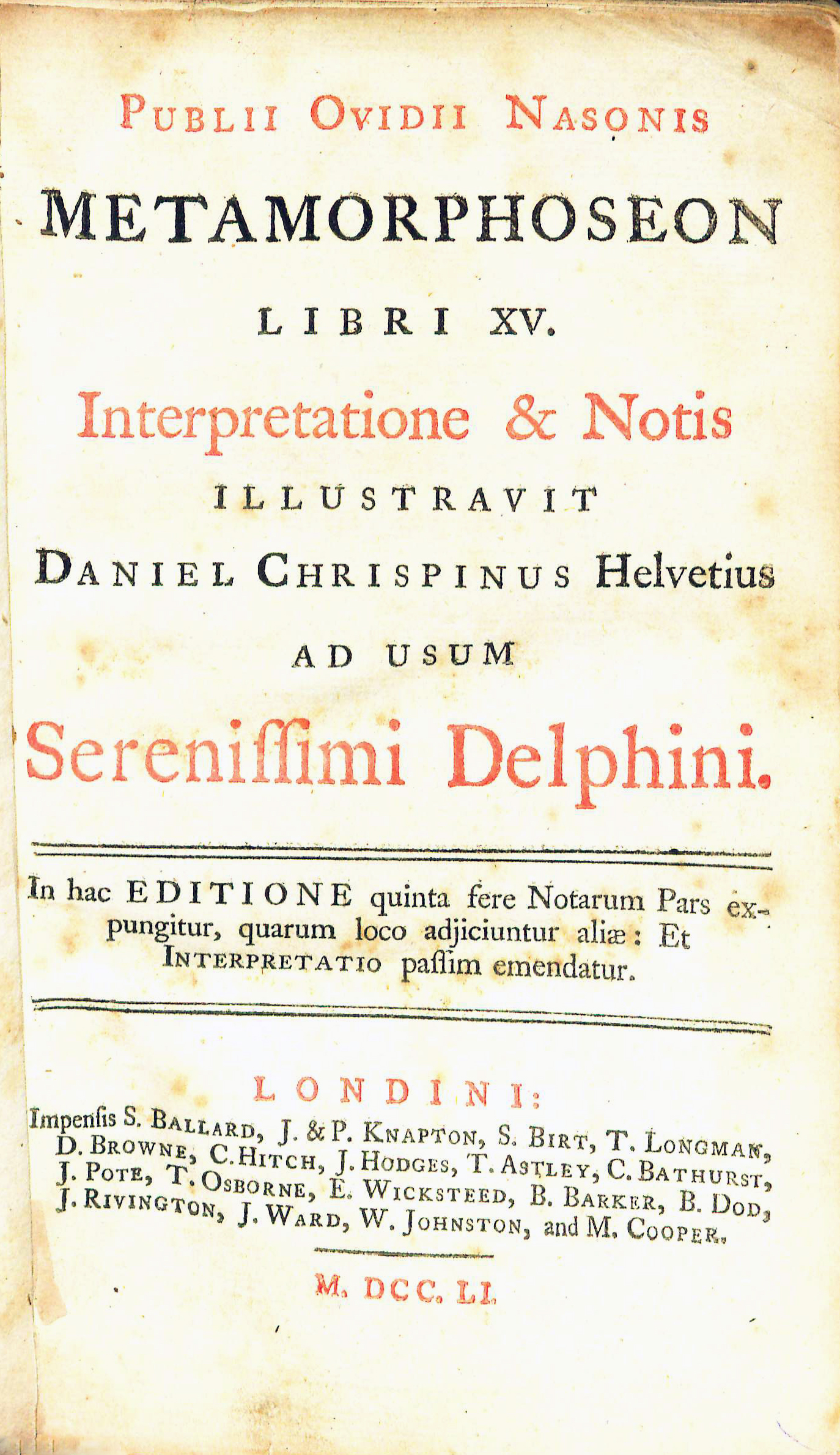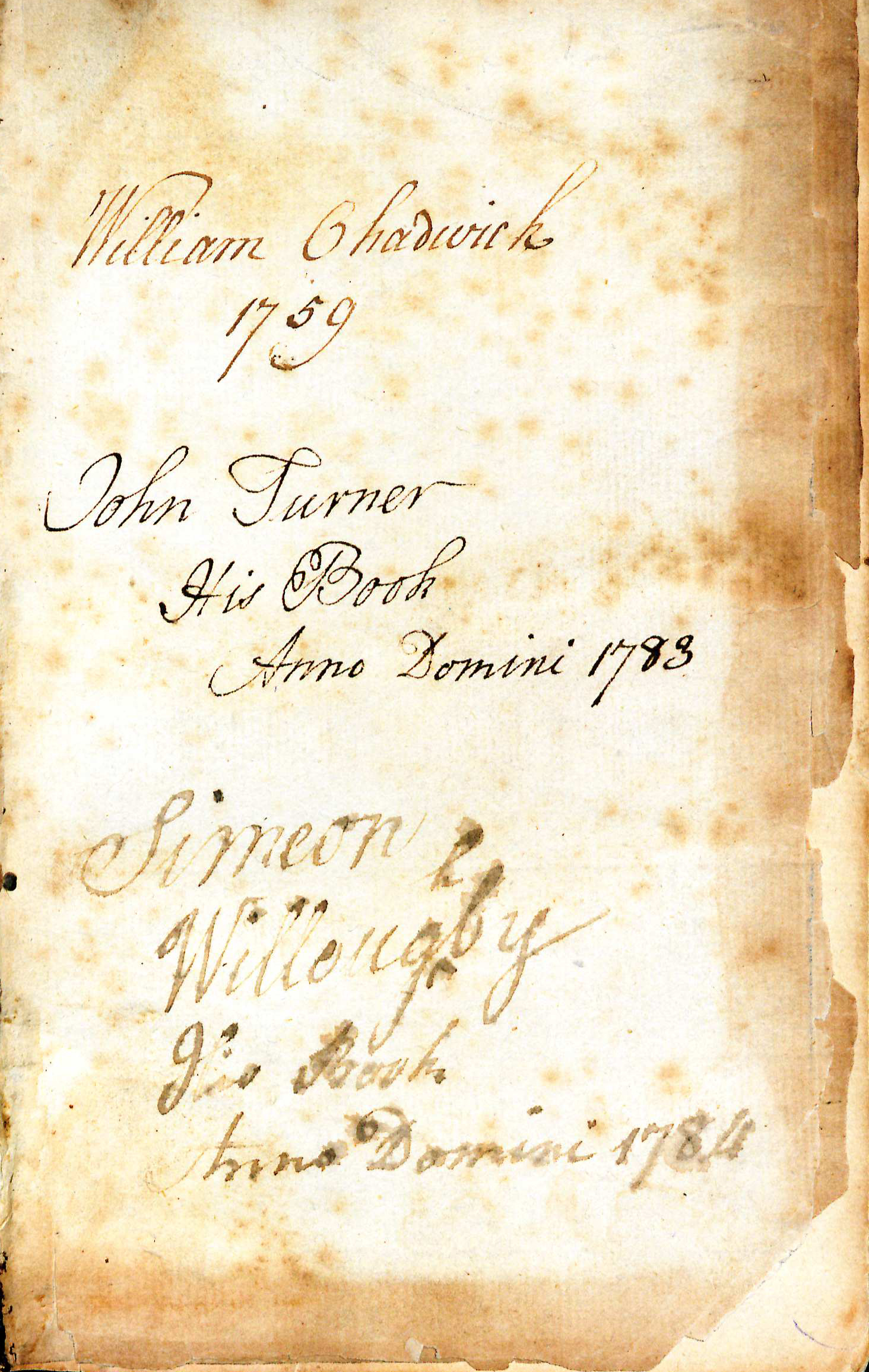Publii Ovidii Nasonis Metamorphoseon Libri XV
by Ovid
| Publii Ovidii Nasonis Metamorphoseon Libri XV | |
|
Title page from Publii Ovidii Nasonis Metamorphoseon Libri XV, George Wythe Collection, Wolf Law Library, College of William & Mary. | |
| Author | Ovid |
| Editor | Daniel Crispin |
| Published | Londini: Impensis S. Ballard, J. & P. Knapton, S. Birt, T. Longman, D. Browne [and 13 others in London] |
| Date | 1751 |
| Edition | In hac editione quinta fere notarum pars expungitur |
| Language | Latin |
| Pages | [8], 475, [173] |
| Desc. | 8vo (21 cm.) |
This particular work is Books 1- 15 of Ovid’s Metamorphoses in the original Latin. It is a fifth edition with the earlier editions’ notes removed. This poem is contained in fifteen books of hexameter which were completed immediately before his exile.[7] The poem contains a wide variety of memorable myths and legends, each telling of some type of supernatural transformation, “call[ing] attention to the boundaries between divine and human, animal and inanimate, raising fundamental questions about definition and hierarchy in the universe.” Ovid’s mastery of elegiac poetry was unsurpassed in his own time due to his variety and creative invention. “No Roman poet can equal Ovid’s impact upon western art and culture. Esp[ecially] remarkable in its appropriations has been the Metamorphoses.”[8]
Evidence for Inclusion in Wythe's Library
Listed in the Jefferson Inventory of Wythe's Library as "Ovidii Metamorphoseon. Delph. 8vo." This was one of the books kept by Thomas Jefferson. He later sold a copy to the Library of Congress in 1815, but it no longer exists to verify the edition or Wythe's prior ownership.[9] George Wythe's Library[10] on LibraryThing merely indicates "Precise edition unknown." The Brown Bibliography[11] includes the 1751 edition based on E. Millicent Sowerby's inclusion of that edition in Catalogue of the Library of Thomas Jefferson. The Wolf Law Library purchased a copy of the same edition.
Description of the Wolf Law Library's copy
Bound in original calf with gilt compartments to spine. Includes previous owner inscriptions "William Chadwick, 1759," "John Turner, His Book, Anno Domini 1783," and "Simeon Willoughby, His Book, Anno Domini 1784" on the front free endpaper. Purchased from Tony Hutchinson.
References
- ↑ "Ovid” in The Oxford Companion to Classical Literature, ed. by M.C. Howatson (Oxford: Oxford University Press, 2011).
- ↑ "Ovid" in Oxford Dictionary of the Classical World, ed. by John Roberts (Oxford: Oxford University Press, 2007).
- ↑ Ibid.
- ↑ "Ovid” in The Oxford Companion to Classical Literature.
- ↑ "Ovid" in Oxford Dictionary of the Classical World.
- ↑ "Ovid” in The Oxford Companion to Classical Literature.
- ↑ "Ovid" in Oxford Dictionary of the Classical World.
- ↑ Ibid.
- ↑ E. Millicent Sowerby, Catalogue of the Library of Thomas Jefferson 2nd ed. (Charlottesville: University Press of Virginia, 1983), 4:449 (no.4339).
- ↑ LibraryThing, s. v. "Member: George Wythe", accessed February 28, 2014.
- ↑ Bennie Brown, "The Library of George Wythe of Williamsburg and Richmond," (unpublished manuscript, May, 2012) Microsoft Word file. Earlier edition available at: https://digitalarchive.wm.edu/handle/10288/13433
External Links
Read this book in Google Books.


